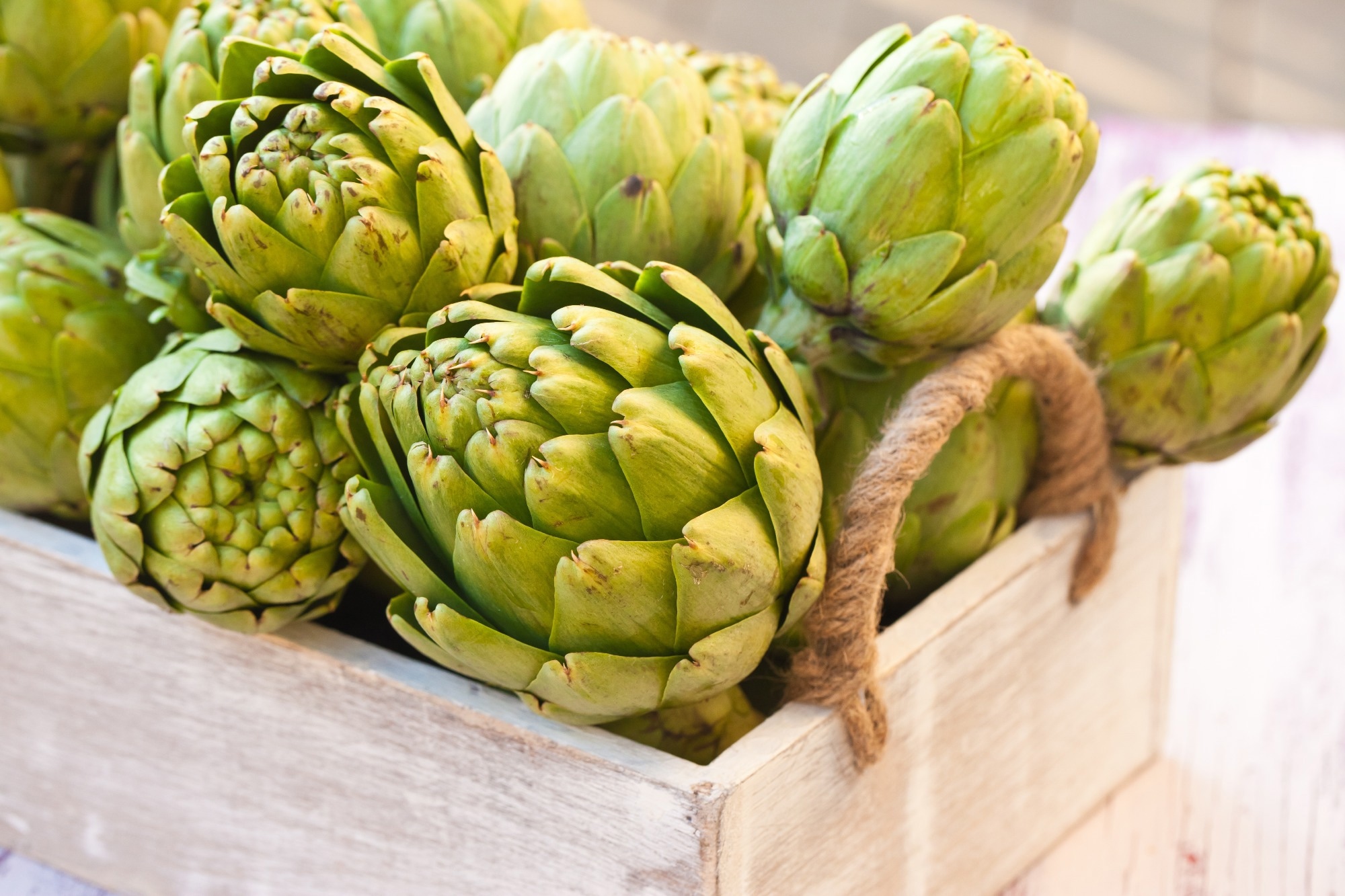Functional foods contain bioactive constituents with beneficial effects on body functions. When consumed in quantities of a regular diet, they can improve health and mitigate the risks of some diseases. The artichoke, native to the Mediterranean region, is a member of the Asteraceae family. It is widely used in food and medicine.
 Study: Functional and Therapeutic Potential of Cynara scolymus in Health Benefits. Image Credit: LENA GABRILOVICH / Shutterstock
Study: Functional and Therapeutic Potential of Cynara scolymus in Health Benefits. Image Credit: LENA GABRILOVICH / Shutterstock
C. cardunculus has three varieties: domestic (C. cardunculus altilis), wild (C. cardunculus silvestris), and cultivated (C. cardunculus scolymus). It is a source of minerals, antioxidants, and polyphenols. The bud encased in green leafy bracts is the main edible portion of the plant, while stems, leaves and external bracts are not consumable and are deemed waste during processing.
However, the inedible portions also contain essential phytochemicals. These non-dietary portions could be an invaluable source of bioactive compounds with potential therapeutic applications in cancer, neurodegenerative disorders, and cardiovascular diseases (CVDs). The present study summarized the nutritional profile, pharmacological effects, and health benefits of C. scolymus.
Bioactive compounds
The bioactive compounds found in artichoke byproducts have been well documented in the literature. The byproducts are characterized by low-fat levels and high levels of insoluble fiber, vitamin C, inulin, minerals (phosphorus, potassium, and sodium), and phenolics and their derivatives (hydroxycinnamic acids and flavonoids). Flavonoids include derivatives of apigenin and luteolin; flavonoid derivatives exert anti-inflammatory and scavenging properties.
Chlorogenic acid (CLA) is the prominent constituent of artichoke extracts. CLA is implicated in improving the well-being associated with artichoke intake. Cynarin, a member of caffeoylquinic acids (CQAs), is known for hepatoprotective effects. Notably, cynarin is not intrinsically present in artichokes but is an artifact formed during aqueous extraction. Besides, artichoke contains considerable levels of sesquiterpene lactones with diverse biological effects.
Antimicrobial effects
Although the artichoke's antibacterial properties have not been thoroughly evaluated, studies suggest inhibitory activity against different pathogens. CQAs have been implicated in bacterial cell wall disruption, whereas flavonoids have been reported to interrupt microbial enzyme activity. Further, growth inhibitory effects of the artichoke stem, leaf, and head extracts have been demonstrated against Salmonella spp., Staphylococcus aureus, and Escherichia coli.
Studies have also reported the antifungal effects of artichoke extracts. Modulation of fungal enzymes and interference with the integrity of the cell membrane contribute to these effects. Further, preliminary evidence suggests that artichoke extracts may cause viral replication inhibition and disruptions in viral attachment to host cells.
Artichoke and the cardiovascular system
CVDs are the global leading cause of mortality, accounting for about 32% of deaths in 2019. Targeting inflammation, oxidative stress, fibrosis, and apoptosis in hyperglycemia, hypertension, and dyslipidemia, which contribute to CVD, remains the central strategy in regulating or managing CVD development.
Artichoke extracts can impact lipid metabolism through reductions in the synthesis of cholesterol and endogenous triglycerides. A study showed that supplementing obese rats with artichoke leaf extracts improved their lipid profile and cardiac markers. Further, studies have revealed that artichoke extracts can prevent the development of atherosclerotic plaques in high-fat diet (HFD)-fed rats.
Individuals with mild hypercholesterolemia treated with two doses of artichoke extracts for eight weeks had significant improvements in total cholesterol (TC), high- (HDL-C) and low-density lipoprotein cholesterol (LDL-C), and TC-to-HDL-C ratio. A trial involving healthy or mildly hypertensive males found that a 12-week administration of concentrated artichoke leaf juice reduced blood pressure.
Neuroprotective effects
A study on a mouse model of obesity showed that ethanolic extracts from the artichoke had beneficial effects on neuroinflammation parameters. Further, another study investigated the effects of these extracts on oxidative and inflammatory stress in different brain regions of HFD-fed mice and found reductions in inflammatory cytokine production.
Moreover, CLA significantly increased cell survival inhibited the activation of nuclear factor kappa B (NF-κB), and reduced the levels of toll-like receptor 2 (TLR2), myeloid differential primary response 88 (MyD88), and TLR9. Isochlorogenic acid B (ICAB) present in artichokes has potential neuroprotective properties.
ICAB can elevate the expression of the brain-derived neurotrophic factor that can protect against memory impairment, anxiety, and depression. Artichoke’s neuroprotective effects were also demonstrated in a murine model of sporadic Alzheimer’s disease. In particular, artichoke leaf extracts improved cognitive function and spatial memory recovery and reduced tumor necrosis factor-alpha (TNF-α), tau protein, and β-amyloid levels.
Pharmacological effects
The therapeutic effects of C. scolymus on hemodynamic parameters and liver function were investigated in non-alcoholic steatohepatitis patients. Daily treatment with six tablets for two months reduced blood sugar, TC, triglycerides, systolic blood pressure, LDL, and serum levels of aspartate and alanine transaminases. Another study found that artichoke powder capsules taken twice daily for eight weeks resulted in lower systolic blood pressure and improvements in body mass index in hypertensive patients.
Concluding remarks
The growing population warrants efficient and sustainable use of natural resources. As such, understanding the proper industrial exploitation is necessary for adequate plant recycling. Artichoke, commonly used in the Mediterranean diet and as a traditional medicine, has potential antimicrobial, anti-inflammatory, neuroprotective, and lipid-lowering properties. Bioactive compounds from this plant could protect against several diseases, underscoring their use as a dietary supplement in combination with conventional treatments.
Journal reference:
- Porro C, Benameur T, Cianciulli A, et al. Functional and Therapeutic Potential of Cynara scolymus in Health Benefits. Nutrients, 2024, DOI: 10.3390/nu16060872, https://www.mdpi.com/2072-6643/16/6/872